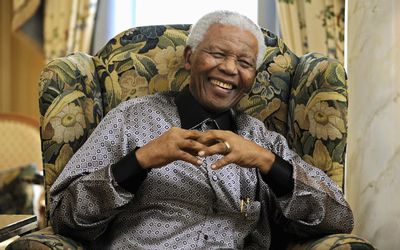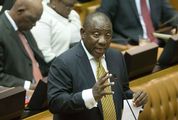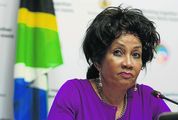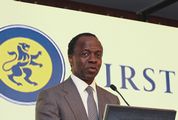NELSON Rolihlahla Mandela was of a generation that had no need for social media such as Twitter, preoccupied as they were with rather more serious matters such as world wars, liberation struggles and nation-building. But being the man he was — astute, farsighted and unusually tolerant of the frivolity of youth — even in his dotage he would have known what Twitter was and what it represents in today’s age, and even if he had no desire to tweet.
Given his famed sense of humour, he would have found it endlessly amusing that rumours of his demise have been circling the globe in the ether with monotonous regularity over the past few years. It does not take much imagination for any South African, or indeed any politically aware human being on Earth, to picture that trademark grin as Madiba contemplated the fact that reports of his death had been so greatly exaggerated.
Alas, today those reports are true. Nelson Mandela is dead almost six months after his 95th birthday, and the whole world is in mourning. There are not many men or women in history of whom that could be said.
Plenty of people disagreed with him at various times, including many of his struggle comrades and fellow members of his beloved African National Congress (ANC). But it is testament to his greatness that even those who may have considered themselves his political enemies will mourn his passing.
For South Africa, Mandela was a piece of serendipity, the right man at the right time — even if he had to waste 27 years of his life waiting in prison for his fellow South Africans of all races to reach the point where his brand of inspired leadership could work its magic.
He knew reconciliation was possible and, crucially, possessed the strength of character to accept that compromise was as essential as a firm line in negotiations with the apartheid regime.
At times that meant having to put as much effort into convincing his fellow freedom fighters that the armed struggle should be suspended as it did persuading Afrikaner nationalists that their future in South Africa could only be assured by letting go.
There will, no doubt, be any number of obituaries to Mandela that will all but sanctify him. But that would do him no justice. He was all too human, and frequently the first to admit that he had not only made mistakes in his life, but had wronged others. This was especially true with regard to his personal relationships — he went to some length towards the end of his life to ensure history would reflect the real man, warts and all. As a politician and founding president of a democratic South Africa, Mandela was inspired, showing the rare qualities of leadership, humility and principle without which it is fair to say the country was highly unlikely to have emerged from oppression without a violent revolution.
But he was not a man for detail, and as such was less effective as an executive president. To his credit, he was not only aware of his shortcomings in this regard but was also acutely conscious of the dangers of a man in his position staying on long enough to be considered indispensable.
Stepping down after just one term sent out a powerful message to South Africa, and Africa as a whole, that democratic principles are greater than any one man.
The great Nelson Mandela was always going to be a tough act to follow, and al though Thabo Mbeki possessed the range of practical administrative and political skills his predecessor lacked, he was so acutely aware of the size of the shoes he had to fill — and resentful over being constantly overshadowed — that failure to do so became almost inevitable.
Jacob Zuma, while possessing some of Mandela’s confidence, charisma and natural charm, also comes off poorly by comparison, even though he doesn’t seem to care nearly as much.
How South Africa could do with a dose of Mandela-style principled leadership, humility and self-sacrifice right now.
In many ways it is better that the Old Man has not been actively involved in public life for the past few years, because it must have pained him at times to see the direction both the ANC and the country have taken.
At the same time, he had the enduring satisfaction of knowing that no matter how many wrong turns his successors might take, such failures of leadership would be within the context of a "normal" country. Mandela sacrificed much in his life to set South Africa on the right path; where we go from here is no longer his responsibility, and certainly not his fault.
The 2010 Soccer World Cup was an extraordinary opportunity to show the world that the spirit of reconciliation Mandela embodied was not dead, and it is a blessing that he was well enough to be able to attend the closing ceremony. South Africa pulled together magnificently to make a success not only of the preparations, but the hosting of the event, an echo of the goodwill and unity of purpose of the political transition he had inspired a decade-and-a-half earlier.
The Mandela funeral will make the World Cup seem like a local derby by comparison. The world’s eyes will be on us once again, and every head of state and celebrity will be fighting for a place on the guest list to pay tribute. While it will be a time of mourning rather than celebration, it is no less important that South Africans conduct themselves in a manner that is worthy of Madiba’s memory.
Public demonstrations of people’s grief are both necessary and inevitable, across South Africa’s communities, but they cannot be allowed to degenerate into chaos, and particularly not into any sort of racial conflict.
Similarly, politicians must refrain from using the emotion of the nation’s loss to score cheap political points that could provoke confrontation.
Above all, it is incumbent on minority groups, who arguably owe Mandela the biggest debt of gratitude, to avoid playing into the urban legends that have circulated for the past few years about the racial conflagration that was allegedly planned by disaffected former freedom fighters to be put into action as soon as the Old Man was gone.
The country does not need to have television pictures broadcast around the world of beleaguered right-wingers sandbagging their windows and stocking up on baked beans, as occurred during the build-up to the first democratic election.
What better tribute to the life of a great man than to redouble our efforts to ensure his vision for the country is realised.
Madiba knew that South Africa would not be able to shake off the legacy of apartheid without both reconciling erstwhile foes and systematically correcting the wrongs of the past. His death should be grasped as an opportunity to honour him by ensuring both initiatives remain on track.

Former president Nelson Mandela at a meeting with British prime minister Gordon Brown in London, in June 2008. Picture: REUTERS
NELSON Rolihlahla Mandela was of a generation that had no need for social media such as Twitter, preoccupied as they were with rather more serious matters such as world wars, liberation struggles and nation-building. But being the man he was — astute, farsighted and unusually tolerant of the frivolity of youth — even in his dotage he would have known what Twitter was and what it represents in today’s age, and even if he had no desire to tweet.
Given his famed sense of humour, he would have found it endlessly amusing that rumours of his demise have been circling the globe in the ether with monotonous regularity over the past few years. It does not take much imagination for any South African, or indeed any politically aware human being on Earth, to picture that trademark grin as Madiba contemplated the fact that reports of his death had been so greatly exaggerated.
Alas, today those reports are true. Nelson Mandela is dead almost six months after his 95th birthday, and the whole world is in mourning. There are not many men or women in history of whom that could be said.
Plenty of people disagreed with him at various times, including many of his struggle comrades and fellow members of his beloved African National Congress (ANC). But it is testament to his greatness that even those who may have considered themselves his political enemies will mourn his passing.
For South Africa, Mandela was a piece of serendipity, the right man at the right time — even if he had to waste 27 years of his life waiting in prison for his fellow South Africans of all races to reach the point where his brand of inspired leadership could work its magic.
He knew reconciliation was possible and, crucially, possessed the strength of character to accept that compromise was as essential as a firm line in negotiations with the apartheid regime.
At times that meant having to put as much effort into convincing his fellow freedom fighters that the armed struggle should be suspended as it did persuading Afrikaner nationalists that their future in South Africa could only be assured by letting go.
There will, no doubt, be any number of obituaries to Mandela that will all but sanctify him. But that would do him no justice. He was all too human, and frequently the first to admit that he had not only made mistakes in his life, but had wronged others. This was especially true with regard to his personal relationships — he went to some length towards the end of his life to ensure history would reflect the real man, warts and all. As a politician and founding president of a democratic South Africa, Mandela was inspired, showing the rare qualities of leadership, humility and principle without which it is fair to say the country was highly unlikely to have emerged from oppression without a violent revolution.
But he was not a man for detail, and as such was less effective as an executive president. To his credit, he was not only aware of his shortcomings in this regard but was also acutely conscious of the dangers of a man in his position staying on long enough to be considered indispensable.
Stepping down after just one term sent out a powerful message to South Africa, and Africa as a whole, that democratic principles are greater than any one man.
The great Nelson Mandela was always going to be a tough act to follow, and al though Thabo Mbeki possessed the range of practical administrative and political skills his predecessor lacked, he was so acutely aware of the size of the shoes he had to fill — and resentful over being constantly overshadowed — that failure to do so became almost inevitable.
Jacob Zuma, while possessing some of Mandela’s confidence, charisma and natural charm, also comes off poorly by comparison, even though he doesn’t seem to care nearly as much.
How South Africa could do with a dose of Mandela-style principled leadership, humility and self-sacrifice right now.
In many ways it is better that the Old Man has not been actively involved in public life for the past few years, because it must have pained him at times to see the direction both the ANC and the country have taken.
At the same time, he had the enduring satisfaction of knowing that no matter how many wrong turns his successors might take, such failures of leadership would be within the context of a "normal" country. Mandela sacrificed much in his life to set South Africa on the right path; where we go from here is no longer his responsibility, and certainly not his fault.
The 2010 Soccer World Cup was an extraordinary opportunity to show the world that the spirit of reconciliation Mandela embodied was not dead, and it is a blessing that he was well enough to be able to attend the closing ceremony. South Africa pulled together magnificently to make a success not only of the preparations, but the hosting of the event, an echo of the goodwill and unity of purpose of the political transition he had inspired a decade-and-a-half earlier.
The Mandela funeral will make the World Cup seem like a local derby by comparison. The world’s eyes will be on us once again, and every head of state and celebrity will be fighting for a place on the guest list to pay tribute. While it will be a time of mourning rather than celebration, it is no less important that South Africans conduct themselves in a manner that is worthy of Madiba’s memory.
Public demonstrations of people’s grief are both necessary and inevitable, across South Africa’s communities, but they cannot be allowed to degenerate into chaos, and particularly not into any sort of racial conflict.
Similarly, politicians must refrain from using the emotion of the nation’s loss to score cheap political points that could provoke confrontation.
Above all, it is incumbent on minority groups, who arguably owe Mandela the biggest debt of gratitude, to avoid playing into the urban legends that have circulated for the past few years about the racial conflagration that was allegedly planned by disaffected former freedom fighters to be put into action as soon as the Old Man was gone.
The country does not need to have television pictures broadcast around the world of beleaguered right-wingers sandbagging their windows and stocking up on baked beans, as occurred during the build-up to the first democratic election.
What better tribute to the life of a great man than to redouble our efforts to ensure his vision for the country is realised.
Madiba knew that South Africa would not be able to shake off the legacy of apartheid without both reconciling erstwhile foes and systematically correcting the wrongs of the past. His death should be grasped as an opportunity to honour him by ensuring both initiatives remain on track.













 News and views on the death, and life, of former president Nelson Mandela
News and views on the death, and life, of former president Nelson Mandela










Register/Login
Close XMy News
You can only set up or view personalised news headlines when you are logged in as a registered user. Thereafter you can choose the sectors of industry in which you are interested, and the latest articles from those sectors will display in this area of your console.
Login or Register.Top Stories
My Watchlist
You can only set up or view your share watchlist when you are logged in as a registered user. Thereafter you can select a list of companies and enter your share details to monitor their performance.
Login or Register.My Clippings
You can only clip articles when you are logged in as a registered user. Thereafter you can click on the "Read later" icon at the top of an article to save it to this area of your console, where you can return to read it at any time.
Login or Register.Change: -1.21%
Change: -1.31%
Change: -1.11%
Change: -1.12%
Change: -2.16%
Data supplied by Profile Data
Change: 0.00%
Change: 0.00%
Change: -1.21%
Change: 0.00%
Change: 0.00%
Data supplied by Profile Data
Change: -0.56%
Change: -0.01%
Change: 0.11%
Change: -0.53%
Change: -0.10%
Data supplied by Profile Data
Change: 0.00%
Change: 0.00%
Change: 0.00%
Change: 0.00%
Change: 0.00%
Data supplied by Profile Data